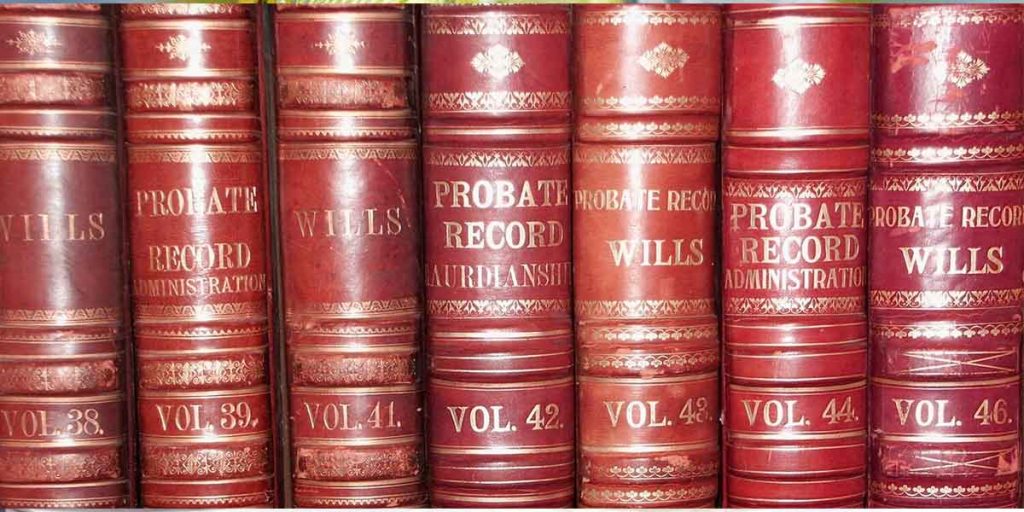Wills
It is a requirement of the wills probate process that a search for a wills notice be completed. A wills notice identifies that a will has been registered and describes the person who has made the will, where the will is located, and the date of the will. Anyone is eligible to conduct a search of wills notice of a deceased person. To be eligible to conduct a search of wills notice for a person who is living, you must be the person themselves or a lawyer. The BC Archives holds wills probated in British Columbia between 1861 and 1981. The wills indexes and the wills on microfilm are self serve and open for access in the reference room. The 1981 wills are in hardcopy and stored off-site.
Probate
Probate/estate files include the proceedings of all business relating to:
- The proving of a will, in cases where there was one, or
- The ultimate settling of an estate in instances where the individual died intestate (without leaving a valid will).
Probate files were usually created and maintained by the court registry closest to the residence of the deceased person or the executor of the will. While the contents may vary, many files contain a copy of the will, if there was one. A typical file might contain:
- copy of the will,
- death certificate,
- inventory of belongings,
- claims from creditors, and
- general family and financial information.
Early probate records for individuals who lived and died elsewhere in the province may be found in the Victoria Probate Registry. In the absence of a local registry, the records would be filed with the Victoria Probate Registry or the registry in the nearest community.
Probate records contain information about family relationships, property holdings and values, and land and building descriptions. Documents in probate records include wills; petitions for probate or administration; bonds, inventories and accounts; receipts from heirs and/or creditors; and petitions for dower, support, distribution, or division. In addition to handling estates of deceased persons, Connecticut probate courts also handled guardianships, adoptions, and conservatorships of “incompetent” persons.
Today, Connecticut probate jurisdictions are districts, not counties or towns. There are 54 current districts. Because several different districts may have covered a certain town over the course of time, the correct district for the time period in question must be determined in order to locate information on a probate matter. This information may be found on the index cards in the Probate Estate Papers Index or by consulting the Probate Court Finding Aids. The finding aids identify the proper probate court for a given Connecticut city or town and indicates what probate materials (and whether original or on microfilm) are available. It shows the probate district(s) to which each Connecticut town has been assigned; the locations of original estate papers and record books, and whether the items have been microfilmed.
How to apply for probate Records
Before you file the forms applying for a grant of probate, you’ll need to value the size of the estate. Here are the steps you need to take to be granted probate.
1. Register the death
First, you’ll need to register the person’s death. This needs to be done within couple of days, though it varies in some other part of the country. It’s a good idea to buy extra copies of the death certificate at this stage.
2. Value the estate
You will need to go through the deceased’s papers and bank statements to establish their assets and liabilities, and find records of any other accounts they hold. For some estates, this is straightforward, but others are far more complex, with multiple investments, properties and personal belongings to consider. You’ll need to contact the following institutions:
- banks, in relation to cash assets and accounts
- lenders, including for mortgages, credit cards and any loans
- fund managers or stockbrokers pension providers
- the local government in relation to outstanding council tax
- the Department of Work and Pensions HMRC in relation to outstanding tax.
When the death is registered, you should receive an identifier for the government’s Tell us Once service, which allows you to contact various government departments in one go. For each financial institution that the deceased had an account with, you’ll need to send them a certified copy of the death certificate and ask for a final statement. Most assets will then be frozen until a grant of probate has been obtained.
3. File probate applications
After assessing the size of the estate and what’s included, you should be in a position to complete a probate application form, or you can apply online here. Once you have worked out the details of the estate, the next stage is to complete a probate application form (PA1P). You can download this from the HM Courts & Tribunals Service website.
Get Help
Do you have more questions about Probate? Our attorneys are ready to give you all the help and answers you need. Call us today.
FAQs
Why might it sometimes be best to have an estate go through probate?
It could be less expensive than paying a lawyer to help you get around it. Also, the nice thing about probate is it’s a final decision for how an estate will be carved up, Probate shouldn’t be looked at as the worst thing in the world.
Do I need a lawyer for a will?
No, you don’t need a lawyer, you probably should hire a lawyer to draft a will if you have multiple intended beneficiaries and a fair amount of assets.









